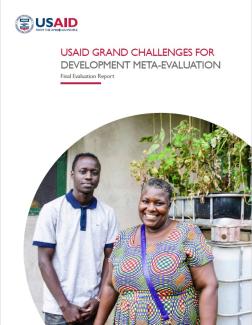The meta-evaluation of nine USAID Grand Challenges for Development (GCs), undertaken by Triple Line in 2020-2021, examines what the GCs have achieved and how they have done so in order to provide USAID with an actionable evidence base. The report sets out the policy context for the introduction of Grand Challenges in 2011 as a new approach to programming and provides information about each of the nine GCs studied. Findings are presented against each of ten evaluation questions, exploring the achievements of the GCs (results, scaling, acceleration, innovation ecosystems, and catalytic effects); aspects of GC implementation (procurement and access, and the engagement of USAID Missions); and how GCs have been managed (measurement of results and cost effectiveness, and governance arrangements).
The findings lead to the evaluation’s conclusions about the achievements and effectiveness of USAID’s GCs: i) that, overall, they have achieved positive results in varied sectors, many of which are likely to be sustainable, and have supported the scaling of some significant innovations; and ii) that the GC model, when implemented well, is a results-driven approach that is both effective at supporting innovations to become scale-ready and at strengthening ecosystems.
The report ends with two sets of practical, actionable recommendations to strengthen GC programing: strategic recommendations for USAID policy and GC managers, and programmatic recommendations for USAID and partner GC managers. The report annexes provide additional methodological information, further supporting analysis undertaken for the evaluation on comparators, cost effectiveness, and gender and social inclusion, and evidence from the grantee survey conducted for the evaluation.

